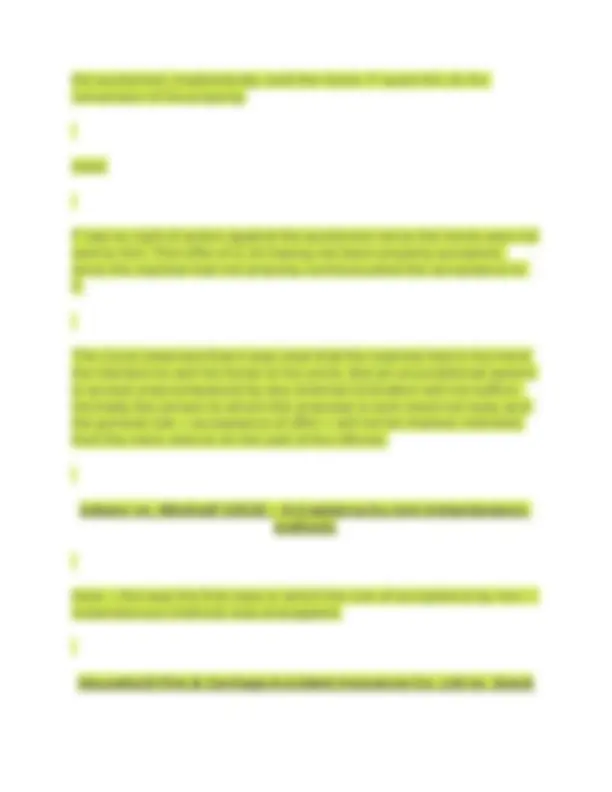




















Study with the several resources on Docsity

Earn points by helping other students or get them with a premium plan


Prepare for your exams
Study with the several resources on Docsity

Earn points to download
Earn points by helping other students or get them with a premium plan
Community
Ask the community for help and clear up your study doubts
Discover the best universities in your country according to Docsity users
Free resources
Download our free guides on studying techniques, anxiety management strategies, and thesis advice from Docsity tutors
All the landmark cases for the Indian Contract Act
Typology: Lecture notes
1 / 26

This page cannot be seen from the preview
Don't miss anything!



















Contract I
Balfour vs. Balfour – Intention to Create Legal Relationship
Facts:
A husband promised to pay his wife a house hold allowance of £ 30 every month. Later the parties separated and the husband failed to pay the promised amount. The wife sued for the promised allowance
Held:
The wife will not succeed as agreements such as this did not create any legal obligations vis a vis legal relations.
Rose & Frank Co. VS Crompton Bros. Ltd. – Intention to Create Legal Relationship
Facts:
There was an agreement between these two companies by means of which rose and frank co. was appointed as the agent of Crompton Bros. Ltd. One clause in the agreement stated that the agreement is not entered into as legal and formal and shall not be subject to legal jurisdiction in the law courts.
Held:
There was no binding and legally enforceable contract between the 2 companies as there was no intention to create legal relationship.
Upton Rural District Council VS Powell – Implied Contract
Facts:
A fire broke out in Powell’s farm. He called upon the fire brigade to put out the fire which the latter did. Now Powell’s farm did not come under fire service zone although he believed it to be so.
Held:
Brockle Hurst, and therefore had no intention to make a contract with Boulton.
Held:
Jones was not liable to pay ( – Section 64 will also apply )
Carlill VS Carbolic Smoke Ball Co. (1893) – General offer
Facts:
The defendant company advertised in several newspapers that a reward of £ 100 would be paid to any person who contracted influenza, cold, or any other disease associated with cold even after using the smoke balls of the company – a preventive remedy, 3 times a day, for 2 weeks in accordance with the printed directions. They also announced that a sum of £ 1000 had been deposited with the Alliance Bank as a proof of their sincerity.
The plaintiff, Mrs. Carlill had seen the advertisement, used the smoke balls according to the printed directions and for a period as specified, but still contracted influenza. She sued the defending company to claim the reward of £ 100 as advertised by the company.
The defendants argued inter alia that it was impossible to contract with the whole world and that she should have notified / communicated to them of her acceptance of the offer.
Held:
Rejecting the argument the Court held that the advertisement constituted the offer to the whole world at large ( – general offer) which was accepted by the plaintiff by conduct. ( – by using smoke balls). Therefore she was justified to the reward of £ 100.
The Court observed that by performing the required act and complying with the necessary conditions attached to the offer of this kind ( – general offer) — the offeree has sufficiently accepted the offer and there is no need for any formal notification / communication of her acceptance to the offer.
Note – This is the principle of English Law of contract and endorsed by Section 8 of ICA. The effect of the decision in Carlill’s case is that performance of stipulated condition of the proposal is not only acceptance of the proposal but it is also sufficient communication of the acceptance.
Harbhajan Lal vs. Harcharan Lal
Facts :
In this case a young boy had run away from his father’s house. The father had offered a reward of Rs. 55 to anyone who finds the boy and brings him home. The plaintiff who was aware of the offer of reward found the boy on a railway station and informed the father. The plaintiff claimed the reward. the father contended that since the plaintiff had not brought the boy; he is not entitled to the reward.
British judge means the( C.J of the privy council ) held that although there is no strict compliance of the condition of the reward, the plaintiff was however aware of the reward, the plaintiff was however aware of the reward an there is substantial performance. The plaintiff was held entitled to succeed.
{information was very much trust worthy based on which father.}
Harvy vs. Facey
Facts :
The defendants were the owners of the plot of land named ” Bumper Hall Pen “. The plaintiff being interested in purchasing the same sent a telegram to the defendants “will you sell us Bumper Hall Pen? Telegraph lowest cash price “.(1st telegram)
The defendants replied also by a telegram ” lowest price for BHP, £ 900 asked by you”. (2nd telegram)
The plaintiff immediately sent another telegram to defendants – “we agree to buy BHP for £ 900 as asked by you”. (3rd telegram)
The defendants subsequently refused to sell the plot of land at that price. The plaintiffs contained that the telegram from the defendants quoting lowest price was an offer and the same has been accepted by the plaintiff and thus, the contract is complete.
The defendants contended that quoting the price was not an offer which could be accepted.
Held:
Lord Parker, the chief justice, stated that the display of an article in a shop window is merely an invitation to treat. It is in sense an offer for sale, the acceptance of which constitutes a contract. It is quite impossible to say that an exhibition of goods in a shop window in itself an offer for sale.
Pharmaceutical Society of Great Britain vs. Boots Cast Chemist Ltd. (1952) – Display of Goods
Held :
The display of articles on shelves in a self-service shop / store merely amounts to invitation to treat.
Ramsgate Victoria Hotel Company vs. Montefeire (1866) – if time not stipulated
Facts :
On 8th June, M offered to take shares in R company. He received a letter of allotment on 23rd November. M refused to take the shares.
Held:
M was entitled to refuse as the offer had lost by the delay of acceptance since the period of 5 months was not a reasonable one.
Hyde vs. Wrench (1840) – Counter offer
Facts :
W, the defendant, had offered to sell his farm to H, the plaintiff, for £
Held:
The Court held that an offer to buy for £ 950 was not an acceptance of the offer to buy because the offer to sale was for £ 1000. it was a counter offer and a counter offer to a proposal amounts to its rejection. As such no contract had come into existence between the parties.
Neale vs. Merret – Counter offer
A draft agreement relating to supply of coal was sent to the manager of a railway company viz. Metropolitan Railway company. For his acceptance the manager wrote the words, approved and put the draft in his drawer of his table intending to sent it to the companies solicitors for a formal contract to be drawn up. Through oversight the contract remained in the drawer.
Held:
There was no contract because there was no communication of acceptance.
Felthouse vs. Bindley (1862) – Acceptance communication necessary
Facts :
F (uncle) offered to buy his nephew’s horse for £ 30 saying “if I hear no more about it I shall consider the horse mine at £ 30.” (offer must not thrust the burden of acceptance.) the nephew did not write / reply to F at all. He told his auctioneer, B to keep the particular horse out of sale of his farm stock as he intended to reserve it for his uncle, F. B
the auctioneer, inadvertently, sold the horse. F sued him, B, for conversion of his property.
Held:
F has no right of action against the auctioneer since the horse was not sold to him. This offer of £ 30 having not been properly accepted, since the nephew had not properly communicated the acceptance to F.
The Court observed that it was clear that the nephew had in his mind the intention to sell his horse to his uncle. But an unconditional assent to accept unaccompanied by any external inclination will not suffice. Normally the person to whom the proposal is sent need not reply and the general rule – acceptance of offer – will not be implied, intended from the mere silence on the part of the offeree.
Adams vs. Mindsell (1818) – Acceptance by non-instantaneous methods
Note – this was the first case in which the rule of acceptance by non – instantaneous methods was propagated.
Household Fire & Carriage Accident Insurance Co. Ltd vs. Grant
Facts :
The plaintiff, baldeo, at the desire and requset of the elecotr of the town expanded money in the construcvtion of a marjet in the town. Subsequently the defendants, Durga Prasad & Ors. Occupied the shops in the market. Since the plaintff had spent money for the constructoin of the market, the defendants in consideratoin thereof, promised to pay to plaintiff, a commission on the articles ssold throuhg their (defendants) shops in that market. Defendants however, failed to pay the promised commission, the plaintiff brought an action to recover the promised commission.
Held:
The plaintiff will not succeed since the agreement was void for the want of consideration.
It was observed in this case that the consideration of the promisre to pay the commission was the construction of market by the plaintiff. But the expenses incuurred by the plaintiff in construction of the market was not there in the desire of the defendants (promisors) but at the instance/ request of the 3rd party ie, contractor of the town.
It was therefore, held that since the consideraion for the construction of markeet did not move at the desire of the defendants., that is, the
promisor ( D & Ors.). It did not constitute a valid / good consideration. Hence the defendants were not liable in respect of the promise made by them, following the first legal rule.
Kedarnath Bhaattacharya vs Gauri Mohammed. (1887, Cal HC )
Facts :
The town planners of howrah,thought advisable to erect a townhall at howrah,provided sufficeient subscription were collected.with the object in view the commisioner of howrah municipality started to raise necessary fund by public subscription.the defendants one of the subscribor’s of this fund for Rs 100 signed his name in the subscription book at that amount.
On the faith of the promised subscription the plaintiff (commisioner of the howrah municpality) entered into a contract with a contractor for the purpose of the building the town hall.
Later the defendant subscriber referred to pay the amount upon the promise to pay / subscribe. In other words ,he contended that there would be no personal benefit / significance by the construction of the hall.
Later the defendant refused to pay on the ground that her uncle (promisee, plaintiff) has not given any consideration. She contended that her uncle was stranger to this consideration and hence he cannot claim the money as a matter of right.
Held:
The Madras HC held that in this agreement between the defendant and plaintiff the consideration has been furnished on behalf of the plaintiff (uncle ) by his own sister (defendant’s mother). Although the plaintiff was stranger to the consideration but since he was a party to the contract he could enforce the promise of the promisor, since under Indian law, consideration may be given by the promisee or anyone on his behalf – vide Section 2 (d) of ICA.
Thus, consideration furnished by the old lady constitutes sufficient consideration for the plaintiff to sue the defendant on her promise. Held, the brother / uncle was entitled to a decree for payment of the
annual sum of money.
Thomas vs Thomas (1842)
Tweddle vs Atkinson (1861) {See Bottom }
Held:
It was held in these cases that the under the English law, that if the consideration is furnished by any person other than the promisee himself, then the promisee is relegated to the position and status of a stranger to the consideration and therefore, he cannot sue for promise.
Harvey vs Gibbons :
Facts :
In this case a servant was promised £ 50 in consideration of promise that he would release a debt to his master.
Held:
This is legally impossible.
Collins vs Godefroy (1831) –